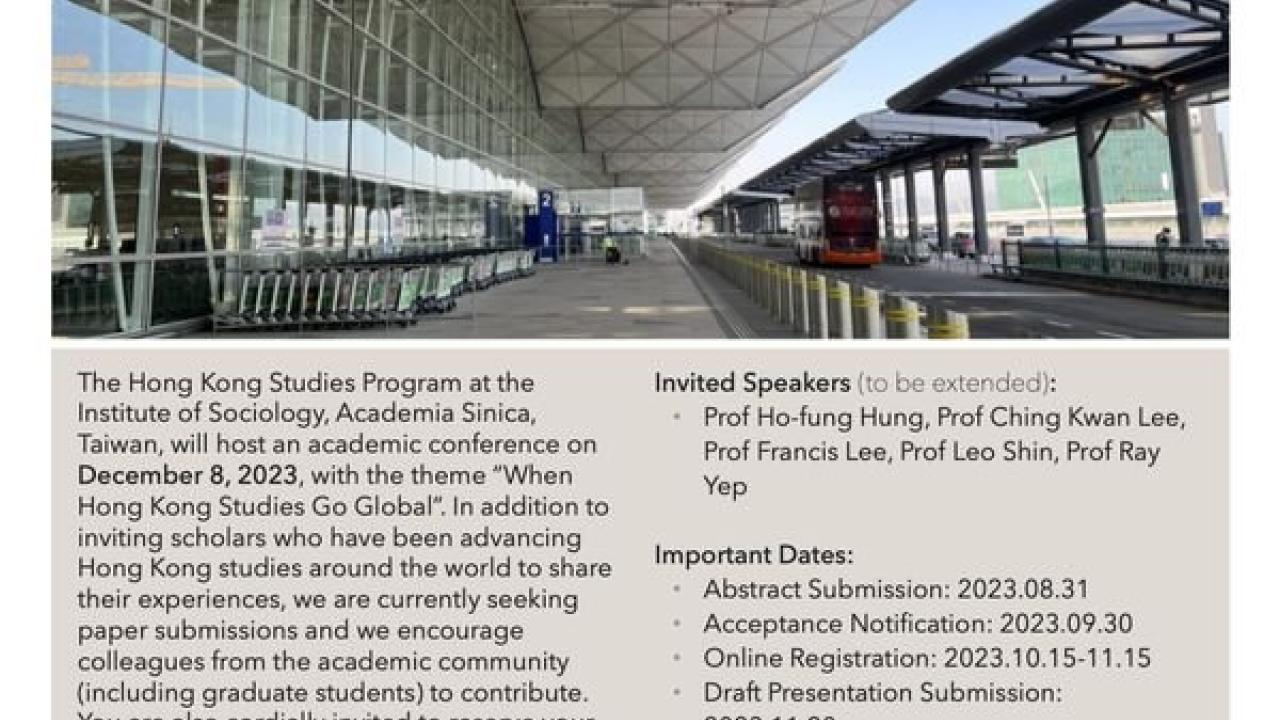
Since the 2019 anti-extradition bill protests, the situation in Hong Kong has seen dramatical changes, and attracted global attention. As a global city, Hong Kong had close ties with the world in terms of trade, economy, and popular culture. However, with the changing political environment and the impact of the pandemic, Hong Kong's international status has been significantly compromised, and its implications deserve serious attention. Apart from the transformations of Hong Kong itself, there is also concern about whether these changes signify a new stage in China's relationship with the world, often referred to as the “new Cold War”. Meanwhile, with hundreds of thousands of Hong Kongers moving to different parts of the world, some living in a state of “exile”, discussion and related research on the identity of diasporic Hong Kongers have emerged. Against this backdrop, research networks and institutions promoting Hong Kong studies have been established around the world, as Hong Kong studies go global.
In response to these developments, the Hong Kong Studies Program at the Institute of Sociology, Academia Sinica, Taiwan, will host an academic conference on December 8, 2023, with the theme “When Hong Kong Studies Go Global”. In addition to inviting scholars who have been advancing Hong Kong studies around the world to share their experiences, we are currently seeking paper submissions and we encourage colleagues from the academic community (including graduate students) to contribute. You are also cordially invited to reserve your time to participate (registration is expected to open in mid-October).
Invited Speakers:
Prof Ho-fung Hung, John Hopkins University
Prof Ching Kwan Lee, University of California (Global Hong Kong Studies)
Prof Francis Lee, Chinese University of Hong Kong (Society for Hong Kong Studies)
Prof Leo Shin, Hong Kong Studies Initiative, University of British Columbia
Prof Ray Yep, University of Bristol (Hong Kong History Centre)
(to be extended)
Topics of Interest:
-
Hong Kong as a Global City: Context and Changes
-
Global Impacts of Hong Kong's Political Issues
-
Overseas Transplantation, Transformation, and Interaction of Hong Kong Culture
-
Lives and Cultural Politics of Overseas Hong Kongers
-
Promoting Hong Kong Studies outside of Hong Kong
-
Other Emerging Issues Related to Hong Kong Studies
The paper can be in either Chinese or English. The author should provide an extended abstract of no more than 800 words (including methodology, findings, and discussion sections), along with their full name, title, and affiliated institution. If there are multiple authors, please specify the presenter(s) who plan to attend. Invited presenters will be provided with meals and accommodation during the conference.
Important Dates:
-
Abstract Submission Deadline: 2023.08.31
-
Acceptance Notification: 2023.09.30
-
Audience Online Registration: 2023.10.15-11.15
-
Draft Presentation Submission Deadline: 2023.11.20
-
Conference Date: 2023.12.08
-
Abstract Submission:
https://tinyurl.com/hkstudiestw
Contact for Details:
Organiser:
The Institute of Sociology of the Academia Sinica was founded in 2000 with the mission to accumulate and expand sociological knowledge, by studying the organising principles, operational processes and historical change of society. It emphasises both Taiwan Studies and the study of neighbouring societies and Chinese societies at large, and seeks to advance comparative studies among different regions or societies that explore their inextricable interrelationships.
The Hong Kong Issue Studies Thematic Research Team was established in 2023 with the aim of connecting scholars concerned about Hong Kong issues, and promoting Hong Kong studies in Taiwan and its connections with the world. One of the key tasks of the team is constructing a Hong Kong Studies Database, as to enrich collections relevant to Hong Kong issues, and with that serve scholars researching Hong Kong topics.
Preparation Committee
Prof Chen Chih-jou, Prof Wu Jieh-min, Prof Chan Kin Man, Dr Leung Kai Chi